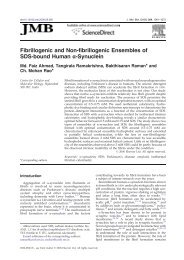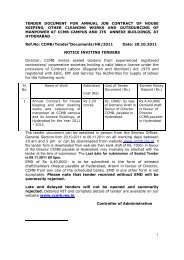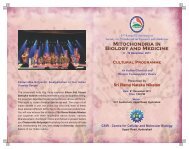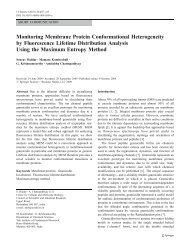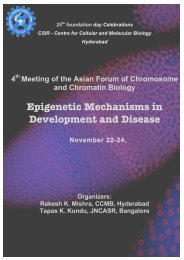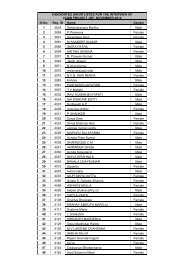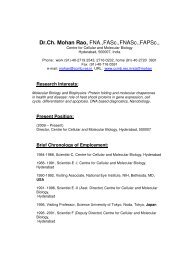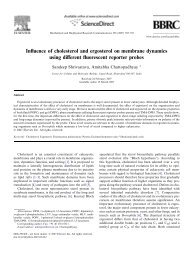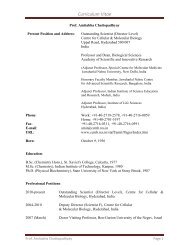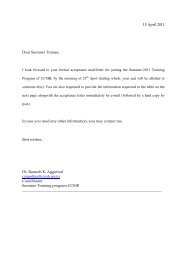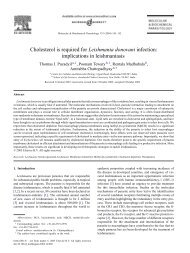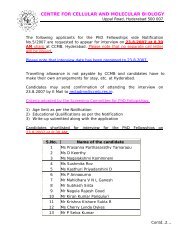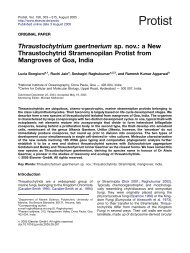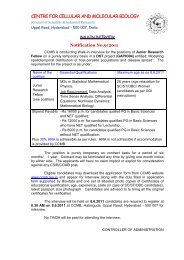Dr Lalji Singh - CCMB
Dr Lalji Singh - CCMB
Dr Lalji Singh - CCMB
You also want an ePaper? Increase the reach of your titles
YUMPU automatically turns print PDFs into web optimized ePapers that Google loves.
F. INFORMATION ON AND RELEVANCE OF RESEARCH CONTRIBUTIONS<br />
1. Development of a universal probe for DNA fingerprinting<br />
<strong>Dr</strong> <strong>Singh</strong> and his colleagues in the <strong>CCMB</strong>, at Hyderabad, developed a probe<br />
called Bkm-derived probe for DNA fingerprinting, as a fall out of their earlier<br />
internationally well-known work on the mechanisms of determination of sex.<br />
This indigenously developed probe is being extensively in use for forensic<br />
investigations, paternity determinations and seed stock verifications. DNA<br />
fingerprinting evidence was presented in the court and for the first time in the<br />
annals of Indian history this result was accepted as an infallible evidence in the<br />
court of law. This verdict was upheld by the Kerala High Court. Since then, this<br />
technology was used in 500 cases of paternity disputes, identification of<br />
missing children, identification of mutilated bodies, identification of exchanged<br />
babies in hospitals and rape and murder cases, etc. These include sensational<br />
cases of assassination of the late Prime Minister Shri Rajiv Gandhi,<br />
assassination of Punjab Chief Minister, Swami Premananda case and the<br />
famous tandoor case of Naina Sahni.<br />
Setting up of CDFD<br />
A separate autonomous "Centre for DNA Fingerprinting and Diagnostics"<br />
(CDFD) has been set up by the Department of Biotechnology, Government of<br />
India to apply and further develop this technology for the benefit of the country.<br />
<strong>Dr</strong> <strong>Lalji</strong> <strong>Singh</strong>, as the First In-Charge Officer on Special Duty to this Centre, had<br />
immensely contributed to its present status (From Oct.1995 to Feb.1999) in<br />
addition to his research and other responsibilities in the <strong>CCMB</strong>.<br />
The Centre is already providing DNA diagnostic services for many genetic<br />
disorders such as Thalassemia, Sickle Cell Anemia, Mental Retardation,<br />
Fragile-X Syndrome, Duchenne Muscular Dystrophy, Huntington's Disease,<br />
Azoospermia, etc. The ultimate aim of the Centre is to develop, acquire and<br />
standardize the protocols for carrier detection, prenatal diagnosis and genetic<br />
counseling for all the genetic disorders prevalent in our country. This is an<br />
important achievement for <strong>CCMB</strong> and CSIR. In recognition of this contribution,<br />
<strong>Dr</strong> <strong>Singh</strong> and his group have recently been awarded the CSIR Technology<br />
Award.<br />
2. DNA fingerprinting using indigenously developed Bkm-derived probe<br />
for phylogenetic analyses<br />
DNA Fingerprinting has so far been used only in individual identification and<br />
establishment of biological relationships owing to its extreme power of resolving<br />
individual specific variation present in the genome.<br />
At the <strong>CCMB</strong>, <strong>Dr</strong> <strong>Singh</strong> and his colleagues by using the indigenously developed<br />
Bkm-derived probe, which is successfully used for human DNA fingerprinting,<br />
have shown, for the first time, that DNA fingerprinting can effectively be used to<br />
infer the generic affinities among related group of animals like crocodilians. This<br />
was hitherto thought not to be feasible largely because the fingerprint profiles<br />
are believed to evolve too rapidly to be informative over large time intervals.<br />
Based on qualitative differences in the fingerprints and quantitative differences<br />
in the copy number of Bkm-related sequences in the genomes, they have been<br />
29




